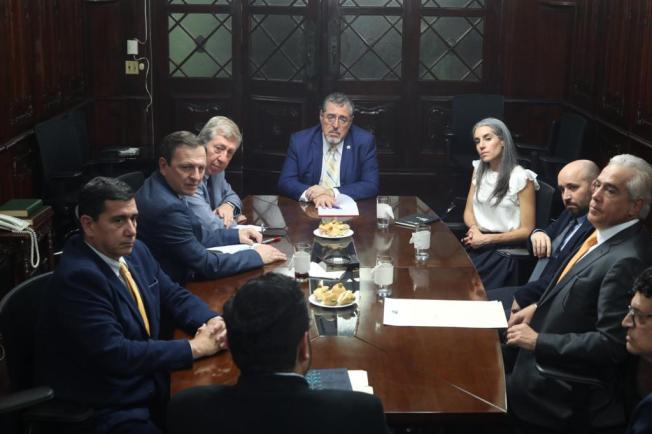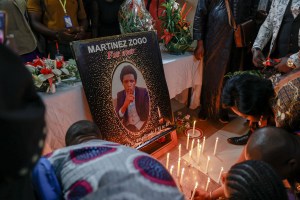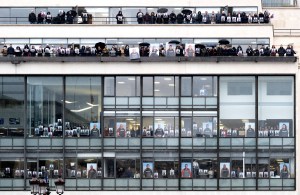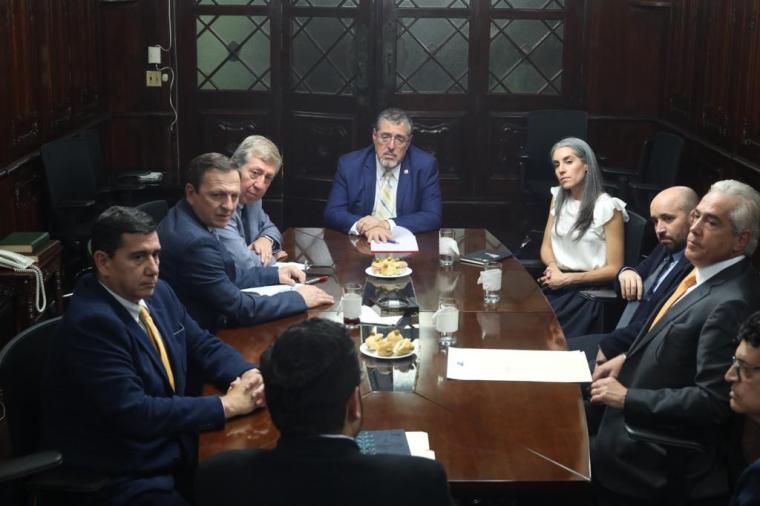Q&A on jailed publisher José Rubén Zamora with CPJ Program Director Carlos Martínez de la Serna

It has been over a year and a half since publisher and journalist José Rubén Zamora was imprisoned in Guatemala. In this time, eight journalists have come under investigation for their reporting on Zamora’s case and nearly two dozen others have been forced into exile over fears that they would face similar legal action for their journalism related to Zamora’s arrest and prosecution in July 2023. The swearing in of a new president in January presents new opportunities to improve press freedom in the country. For this issue of Insider, we spoke with CPJ Program Director Carlos Martínez de la Serna about Zamora’s case—and how CPJ can help.
Could you tell me a little bit about José Rubén Zamora’s case?
José Rubén Zamora is a very prestigious journalist who is well known in Guatemala and in the region. He has faced many press freedom challenges over his career. In June 2023, when Guatemala’s previous administration was still in power, he was convicted of money laundering and sentenced to six years in jail. In October 2023, an appeals court overturned the conviction, and he is now awaiting a new trial.
From the beginning, when CPJ examined the accusations, we concluded that there was no case and that imprisoning him was retaliation for his hard-hitting investigative reporting. Now, after a year and half of imprisonment, an independent report by Trial Watch concluded he is being denied his right to defense and that his imprisonment amounts to arbitrary detention.
CPJ traveled earlier this year to Guatemala and visited José Rubén Zamora in prison. Could you tell us more about that visit and how he’s doing?
This marked our second visit with Inter American Press Association (IAPA); the initial one took place in November 2022, just a few months after his incarceration, when Zamora shared with me allegations that he had been subjected to sleep deprivation, which amounts to psychological torture, and that his cell was infested with insects.
The second time I went, it wasn’t as difficult to meet him in prison. The first time it required a lot of work just to secure the prison visit. Now the government and the director of the facility helped us with everything. The situation has changed regarding his security and his overall situation: though he is still in solitary confinement, he now has access to more than one hour of daylight per day. Overall, the conditions are still poor, but they have improved. During our interaction, we reiterated our unwavering support, for which he expressed gratitude, acknowledging CPJ’s steadfast presence since the outset.
While in the country, CPJ also met with newly elected officials, including the new president of Guatemala, Bernado Arévalo. Are you hopeful the new president will be an advocate for press freedom?
I think he will be. I think he already is. During that visit, we made the case to the government that there wasn’t any reason to hold Zamora in prison, that he needs to be released, that the case needs to be dropped, and that there should be some form of reparation for the damages he’s suffered, including having to shut down his newspaper elPeriódico. We received acknowledgement from the authorities regarding the complexity of his case and the challenges involved in securing his release.
This new government understands that different institutions within Guatemala have been co-opted by the previous government. It’s not that easy because, for example, the judiciary system is still under the old regime. Arévalo understands this challenge and he respects the independence of the different powers, but he told us he’s going to do his best to get him released. In his words, it’s “an emblematic case.” By comparison, when I met with officials appointed by the previous government, we didn’t see the same level of understanding. So there is certainly more willingness to cooperate.
What’s next for Zamora’s case and what else is CPJ doing to advocate for his release?
I talk with his family every week. We know when the hearings are scheduled so we support them by making clear calls for them to take place, and also flag the ongoing lack of due process. We are in constant communication with different U.S. representatives and the State Department. We share developments and challenges in the case, and we ask them to keep supporting him publicly. We are applying all the pressure we can in the hope that Zamora’s legal rights will be respected and he will be released.
CPJ releases annual report on journalists killed in 2023

CPJ released a report showing that 99 journalists and media workers were killed in 2023—the majority of them Palestinians killed in the Israel-Gaza war. The conflict claimed the lives of more journalists in three months than have ever been killed in a single country over an entire year. The 2023 global total – the highest since 2015 and an almost 44% increase on 2022’s figures – includes a record number of journalist killings – 78 – that CPJ research determined were work-related, with eight more still under investigation. Divisive elections, rising authoritarianism, ongoing conflicts, and powerful and expanding organized crime networks create conditions that continue to put journalists in peril. In some nations, these threats have become entrenched, resulting in the killings of at least one journalist a year for decades.
To learn more, you can read the report here or watch and share CPJ’s video:
Leading news outlets back journalists in Gaza

In a strong show of solidarity, CPJ—with the support of the World Association of News Publishers (WAN-IFRA)—coordinated an open letter from leaders of over 80 major news organizations worldwide, including the Associated Press, Agence France-Presse, and Reuters, expressing their unwavering support for journalists reporting from Gaza. The letter highlights as well as the urgency of protecting journalists as they do their vital work in the deadliest conflict for the media ever documented by CPJ. To read the letter in full, click here.
Must-read
CPJ called on Ethiopian authorities to release French journalist Antoine Galindo who was arrested while interviewing Bate Urgessa, a political officer with a party legally recognized in Ethiopia. “The baseless and unjustified detention of Antoine Galindo for carrying out his legitimate journalistic duties is outrageous,” said Angela Quintal, head of CPJ’s Africa program. On February 29, he was released and subsequently left the country to return to France.
CPJ joined a combined 120 people and entities, including victims and their families, media outlets, press freedom groups, and human rights groups, in two letters calling on the United Nations to help provide accountability in the killing in south Lebanon of journalists by Israeli strikes. United Nations special rapporteurs noted that “the journalists could not have been mistaken for combatants, given their clear press insignia and that they were standing outside in the open for almost an hour prior to the attack.”
After Mexican president Andrés Manuel López Obrador provided contact information for The New York Times’ Mexico bureau chief Natalie Kitroeff, CPJ called on authorities to refrain from publicizing personal information of journalists. “In the deadliest country for journalists in the Western Hemisphere, where the vast majority of crimes against the press linger with impunity, reporters are constantly subjected to threats sent to their personal communication devices, with few, if any, of those threats ever properly investigated,” Jan-Albert Hootsen, CPJ’s Mexico representative, said in a statement.
CPJ in the news
“The journalists killed in Gaza — and what they tried to show the world,” The Washington Post
“Peter Greste, Jodie Ginsberg and Jason Rezaian on the dire state of press freedom,” ABC listen
“An Essential Intervention on Behalf of Embattled Palestinian Journalists,” The Nation
“Senegal police clamp down on protesters as opposition rejects election delay,” Associated Press
“Committee to Protect Journalists urges unhindered reporting, internet access,” DAWN
“In 2023, Over 70% of Journalists Killed Were Palestinian, Report Says,” VOA
“French journalist says leaving India after expulsion threat,” Le Monde
“Despite mounting criticism, Greece’s prime minister defends record on rule of law,” Associated Press
“9 human rights groups call on UK PM to take urgent action to help protect journalists in Gaza,” Arab News
“The War the World Can’t See,” The New York Times
